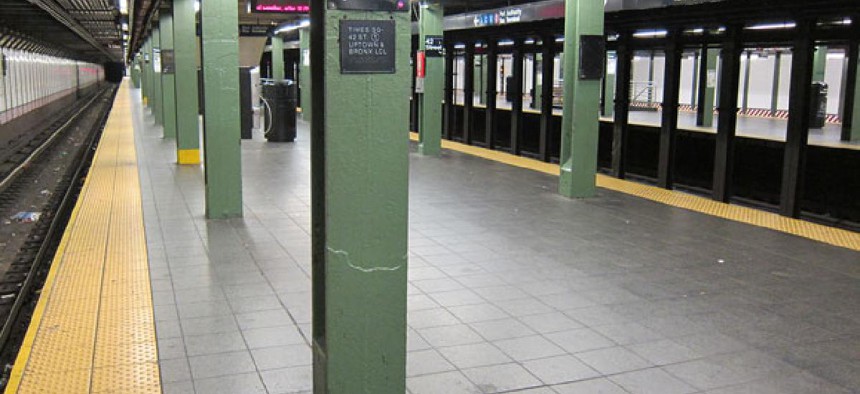
The Times Square station is normally the busiest in the New York system. MTA photo
Sandy provokes largest preemptive public transportation shutdown
Metro won't reopen until it conducts 'a comprehensive damage assessment.'
As residents of the U.S. Northeast's largest cities wake up Monday morning, they're finding few options other than to stay put at home. Hurricane Sandy's daunting approach has led to an unprecedented preemptive response from officials to bring some of the most densely populated areas of the United States to a virtual standstill.
By 10 p.m. Sunday night, mass transit agencies in New York, Philadelphia, Baltimore, and Washington, D.C. had announced that trains and buses would not operate Monday, marking the first time in U.S. history such widespread public transportation service suspensions have been announced before the serious part of a storm has even begun.
The closures don't stop with transit. School districts from Virginia to Boston have cancelled classes. The federal government in Washington is closed. The New York Stock Exchange will take a rare day off from trading after Mayor Michael Bloomberg imposed mandatory evacuation zones on parts of Lower Manhattan and Staten Island.
Those considering driving a car or even walking down the street in cities within Sandy's immediate path are being strongly encouraged to think again. Even alternative transportation options, such as D.C.'s Capital Bikeshare, will be unavailable.
We're used to hurricanes and tropical storms making landfall on the East Coast, prompting evacuations of coastal areas. Strong Atlantic storms have hit Northeast cities before, of course, notably 1999's Hurricane Floyd and 1985's Hurricane Gloria. But so far, there really does seem to be something different about Sandy. She's been called the largest tropical cyclone ever. Record, life-threatening storm surges are possible. And directly in the path of it all: dense urban populations, large portions of whom rely on public transportation, that have been substantially immobilized.
The situation could go on for days even after the storm has passed. The Washington Metropolitan Area Transit Authority, for example, has announced that it will not reopen until it has performed "a comprehensive damage assessment, including inspections of track, bridges, aerial structures, stations and facilities." New York's MTA has said much the same, noting that its post-storm inspection "is expected to be a lengthy process." And that's assuming any damage sustained by these systems isn't too severe.
Read the rest at The Atlantic Cities.
NEXT STORY: Does BYOD Boost Productivity?






